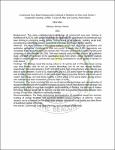| dc.contributor.author | Oboi, Alex | |
| dc.contributor.author | Obonyo, Jimmy Francis | |
| dc.date.accessioned | 2023-05-09T11:31:18Z | |
| dc.date.available | 2023-05-09T11:31:18Z | |
| dc.date.issued | 2022 | |
| dc.identifier.citation | Oboi, A., and Obonyo, J. F. (2022). Commercial Soya Bean Farming and Livelihood of Members of Alito Joint Farmer’s Cooperative Society Limited: A Case of Alito Sub-County, Kole District | en_US |
| dc.identifier.uri | http://ir.lirauni.ac.ug/xmlui/handle/123456789/639 | |
| dc.description.abstract | Background: This study established the contribution of commercial soya bean farming to
livelihood of AJFCSL with specific objectives to established the contribution of commercial soya
bean farming in promoting saving culture; Strengthening social networks; building social trust;
and analyzing relationship between commercial soya bean farming and family stability.
Methods: The study adopted a descriptive research design and used both quantitative and
qualitative approaches. Conducted in Alito sub-county, a sample size of 155 respondents was
considered in the study that had more farmers (96.77%) who were mainly married (74.84%) and
comprising of more females (56.13%). Data was analyzed using thematic analysis for qualitative
study, and IBM SPSS version 23 for quantitative study from which a linear regression analysis
helped in establishing how commercial soya farming contributed to social capital of farmers in
Kole district.
Findings: The findings reveal that saving culture is -0.2 points and -0.178 points lower among
soya bean farmers who do not use modern technology and do not own storage facilities,
respectively; that social network is 0.637 and 0.423 points high among farmers who cultivate soya
bean on acres between 1-5 and 5-10, respectively; and is 0.326 points higher for average yields of
over 6,000kgs; that social trust is -0.298 points lower among soya bean farmers who do not use of
modern technology; and that family stability is 0.440 points 0.475 points higher among farmers
who cultivate soya bean on between 1-5 acres and 6-10 acres.
Conclusion: The study concludes that non use of appropriate technology and non-ownership of
storage facilities lowers the household prospects in saving culture; that planting more acreage; and
getting better yields of soya bean strengthen social networks of farmers; that non-use of modern
technology reduces social trust for farmers; and that there is a positive relationship between more
acreage of soya bean cultivation and family stability.
Recommendations: The study recommends the introduction of subsidized tractor-hire services;
building of storage facilities; and awareness creation among members of AJFCSL. Further
research can be considered on the relationship between commercial soya farming and other forms
of livelihood capitals of farmers.
Key words: Commercial Soya Bean, Farming, and Livelihood of Members. | en_US |
| dc.language.iso | en | en_US |
| dc.publisher | Lira University | en_US |
| dc.subject | Commercial Soya Bean | en_US |
| dc.subject | Farming | en_US |
| dc.subject | Livelihood of Members | en_US |
| dc.title | Commercial Soya Bean Farming and Livelihood of Members of Alito Joint Farmer’s Cooperative Society Limited: A Case of Alito Sub-County, Kole District | en_US |
| dc.type | Thesis | en_US |

